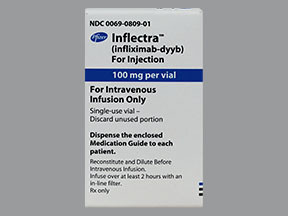INFLIXIMAB-DYYB - INJECTION
PHONETIC PRONUNCIATION: (in-FLIX-i-mab)
COMMON BRAND NAME(S): Inflectra
GENERIC NAME(S): infliximab-dyyb
Uses
USES: This medication is used to treat certain types of arthritis (rheumatoid arthritis, arthritis of the spine, psoriatic arthritis), certain bowel diseases (Crohn's disease, ulcerative colitis), and a certain severe skin disease (chronic plaque psoriasis). In these conditions, the body's defense system (immune system) attacks healthy tissues. Infliximab-dyyb works by blocking the actions of a certain natural substance (tumor necrosis factor alpha) in the body. This helps to decrease swelling (inflammation) and weaken your immune system, which slows or stops the damage from the disease.
How to use INFLIXIMAB-DYYB - INJECTION
HOW TO USE: Read the Medication Guide provided by your pharmacist before you start using infliximab-dyyb and each time you get a refill. If you have any questions, ask your doctor or pharmacist. This medication is given by injection into a vein over at least 2 hours as directed by your doctor. The dosage is based on your medical condition, weight, and response to treatment. After the first dose, this medication is usually given again after 2 weeks and 6 weeks, then every 8 weeks (or every 6 weeks for arthritis of the spine), as directed by your doctor. If you are using this medication at home, learn all preparation and usage instructions from your health care professional. Do not shake this medication. Before using, check this product visually for particles or discoloration. If either is present, do not use the liquid. Learn how to store and discard medical supplies safely. Your doctor may direct you to use other medications (to help prevent side effects) before using infliximab-dyyb. Use those medications exactly as directed. Use this medication regularly to get the most benefit from it. To help you remember, mark the days on the calendar when you need to receive the medication. Tell your doctor if your condition lasts or gets worse.
Side Effects
Precautions
Interactions
Overdose
Images
Reviews
Faq for INFLIXIMAB-DYYB - INJECTION
Infliximab-Dyyb is a prescription medication that belongs to a class of drugs called tumor necrosis factor (TNF) blockers. It is used to treat certain autoimmune diseases, including rheumatoid arthritis, Crohn's disease, ulcerative colitis, psoriasis, and ankylosing spondylitis.
Infliximab-Dyyb is usually administered by a healthcare professional through an intravenous (IV) infusion, meaning it is given directly into a vein over a period of time. The dosage and frequency of infusions depend on the specific condition being treated.
Common side effects of Infliximab-Dyyb may include headache, nausea, fever, stomach pain, back pain, infusion reactions, and respiratory infections. It is important to report any severe or persistent side effects to your healthcare provider.
The response time to Infliximab-Dyyb can vary depending on the condition being treated. Some patients may start experiencing symptom improvement within a few weeks, while others may take several months to notice the full effects. Regular follow-up with your healthcare provider is important to monitor your response to the medication.
Infliximab-Dyyb may increase the risk of serious infections, including tuberculosis and fungal infections. It is important to let your healthcare provider know about any history of infections, as well as any other medical conditions or medications you are taking. Before starting Infliximab-Dyyb, your healthcare provider may perform tests for latent tuberculosis and other infections.
Live vaccines should generally be avoided while receiving Infliximab-Dyyb, as the medication can weaken the immune response and potentially interfere with the effectiveness of the vaccine. It is recommended to discuss vaccination plans with your healthcare provider before starting treatment with Infliximab-Dyyb.
Warning
WARNING: This medication can decrease your body's ability to fight an infection. This effect can lead to very serious (possibly fatal) infections (such as fungal infections, bacterial infections including tuberculosis). You should have a tuberculosis (TB) skin test before and during treatment with this medication. Also tell your doctor your medical history, especially of past/recent/current infections. You should also tell your doctor if you have lived or traveled in areas where certain fungal infections (such as coccidioidomycosis, histoplasmosis) are common or if you have been near someone with tuberculosis. Areas where these types of fungal infections are commonly found include the Ohio and Mississippi River valleys and the southwestern United States. See Side Effects section for symptoms of infections to watch out for, and get medical help right away if you have any of these symptoms. The immune system also helps prevent and control cancer. There is a very small risk (especially in children/teens/young adults) of developing cancer (such as lymphoma, skin) due to this medication or due to your medical condition. A rare, mostly fatal cancer (hepatosplenic T-cell lymphoma) has occurred in people receiving this medication along with certain other drugs (azathioprine or 6-mercaptopurine) to treat Crohn's disease or ulcerative colitis. Talk to your doctor about the risks and benefits of treatment. Tell your doctor right away if you have symptoms such as unusual lumps/growths, swollen glands, swollen or painful abdomen, unexplained weight loss, unusual tiredness, loss of appetite, fever that doesn't go away, or night sweats.
Disclaimer
IMPORTANT: HOW TO USE THIS INFORMATION: This is a summary and does NOT have all possible information about this product. This information does not assure that this product is safe, effective, or appropriate for you. This information is not individual medical advice and does not substitute for the advice of your health care professional. Always ask your health care professional for complete information about this product and your specific health needs.

No Reviews Yet